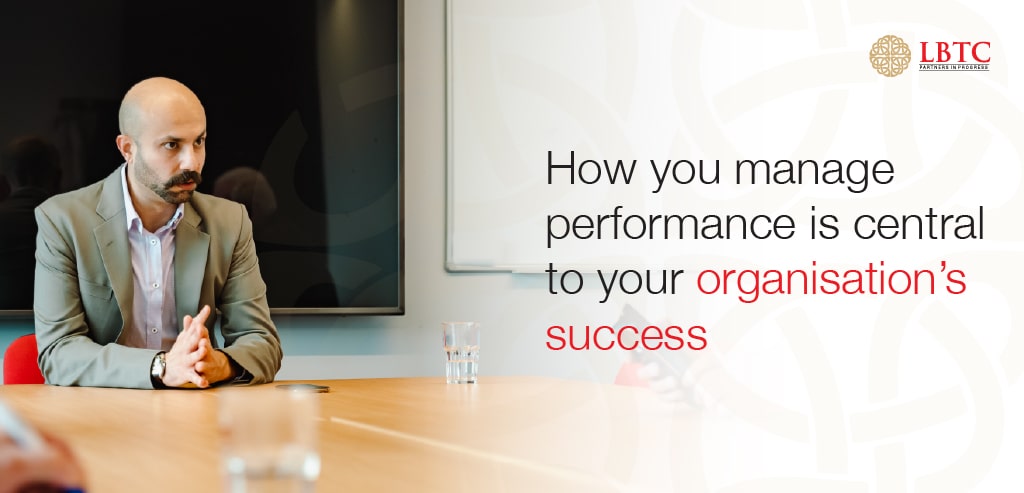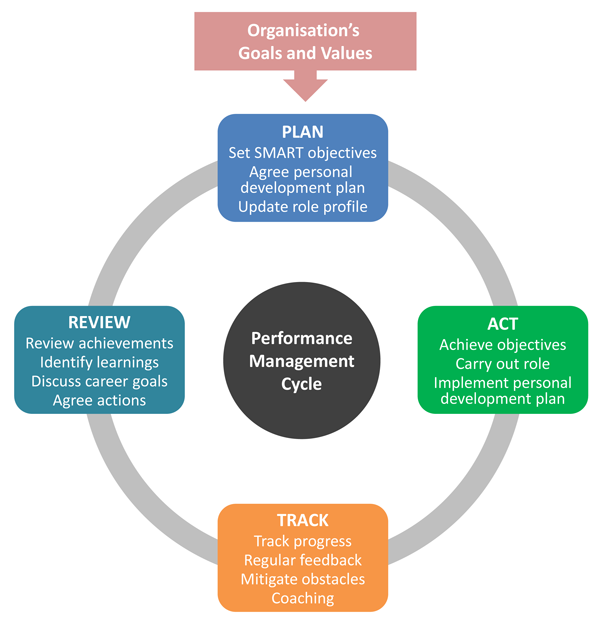
The field of performance management is difficult to navigate. It is constantly changing, so an effective performance management system is required. Every year, there are new trends in performance management that, unfortunately, human resource departments frequently get wrong.
Employees become discouraged, unmotivated, and disengaged as a result. The low levels of both team and individual employee performance frustrate managers. Thankfully, many businesses are seeing the value of effective performance management systems. Realising what an effective performance management system is the first step in revisiting and improving your current performance processes.
Performance Management Cycle:
The performance management cycle, as outlined by Armstrong, comprises four key stages: Planning, Acting, Tracking, and Reviewing. These stages are integral to ensuring continuous improvement and alignment with organisational goals.

Planning:
- Establish SMART objectives: Clearly defined, Specific, Measurable, Achievable, Relevant, and Time-bound goals.
- Develop a Personal Development Plan: Identify the skills, behaviours, and knowledge required for individual success.
- Outline actions for the upcoming months.
- Review and update the employee’s job requirements and role profile as needed.
Acting:
- Emphasises the execution of plans and actions.
- Encourages individuals to dedicate regular time to achieving their objectives and personal development plans.
- Requires continuous effort and commitment throughout the year.
Tracking
- Involves consistent monitoring of progress and performance.
- It is essential to have regular check-ins between managers and employees to provide feedback and coaching.
- Identifies challenges and opportunities for learning and improvement.
- Encourages ongoing communication and collaboration to address issues promptly.
- Align individual objectives with the organisation’s overall strategy, ensuring each SMART objective contributes to organisational goals.
Reviewing:
- I have traditionally given more emphasis, often for reward purposes.
- Highlights the importance of evaluating performance at any point during the year, not just annually.
- Ensures that objectives and development plans are not only discussed at the end of the year, preventing partial achievement.
Essential Components for Effective Performance Management
A few fundamental components go into creating a practical performance management framework, such as:
Establishing Objectives
It would help if you established your goals appropriately. They must be considerate and understood. Workers ought to understand the context in which these personal objectives fit and how they advance organisational aims.
Collaboration and Transparent Communication
Employees expect and deserve their managers and leaders to always be transparent and genuine. They don’t want to be kept in the dark when their companies struggle.
Employee Appreciation
Employee recognition and reward should be given top priority in an effective performance management system. Employees ought to experience a sense of worth and appreciation for their labour and dedication.
Employee Development
No ambitious top performer wishes to work for a company for an extended period without improving and developing their abilities. Employee advancement and development are significant, and businesses can profit from having more capable and skilled workers.
Effective Employee Performance Management: What Exactly Is It?
While having every component of the performance management cycle in place is crucial, there are other guarantees that your organisation will experience effective performance management. Numerous additional factors are also at play, including:
- While having every component of the performance management cycle in place is crucial, there are other guarantees that your organisation will experience effective performance management. Numerous additional factors are also at play, including:
- Having senior management and leadership support performance management
- Making sure the performance management cycle is ongoing rather than a one-time event
- Making sure performance reviews and conversions are meaningful tasks rather than “tick-box” exercises
- Putting in place user-friendly performance management software that supports effective performance management and provides visibility into performance management activities
- The ability and willingness of your managers to provide daily effective performance management.
Bottom line
Crucially, the additional factors influencing effective performance management, such as senior management support, ongoing cycles, meaningful reviews, and user-friendly performance management software, play pivotal roles. In this landscape, performance management training emerges as a critical solution. Investing in training becomes a strategic imperative, equipping managers and employees with the skills needed to navigate the complexities of performance management effectively.

Leave a Reply